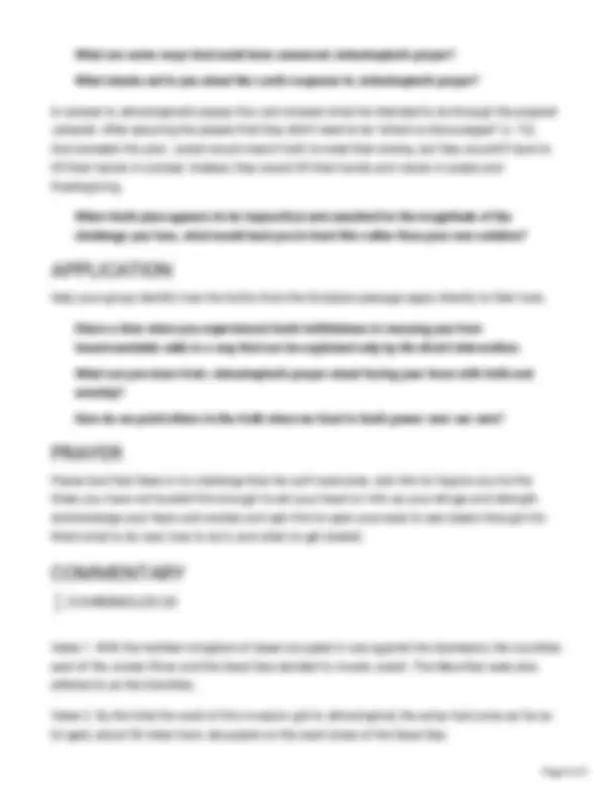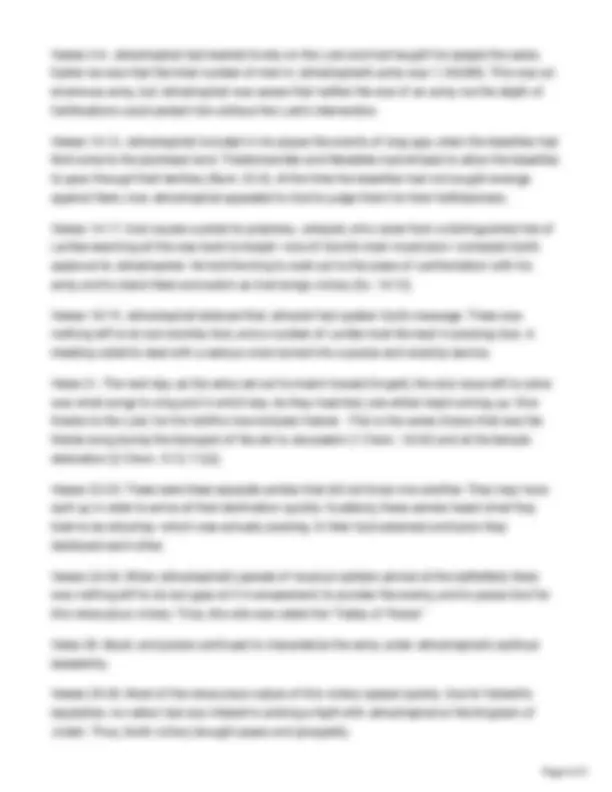





Study with the several resources on Docsity

Earn points by helping other students or get them with a premium plan


Prepare for your exams
Study with the several resources on Docsity

Earn points to download
Earn points by helping other students or get them with a premium plan
Community
Ask the community for help and clear up your study doubts
Discover the best universities in your country according to Docsity users
Free resources
Download our free guides on studying techniques, anxiety management strategies, and thesis advice from Docsity tutors
The biblical account of King Jehoshaphat's response to a crisis through prayer and praise. Discover how Jehoshaphat's faith in God's power helped him and his people face insurmountable odds. Reflect on the importance of prayer during crises and its impact on those around us.
What you will learn
Typology: Study Guides, Projects, Research
1 / 5

This page cannot be seen from the preview
Don't miss anything!




Prayer and praise are always the appropriate responses for anything that comes our way.
As your group time begins, use this section to introduce the topic of discussion.
When was a time you faced a crisis that caused you great fear? How do you typically respond in a situation when you don’t know what to do?
Does it seem to you that most people you know are either going through a crisis, have just come through a crisis, or are facing the prospect of an impending crisis? There’s no question about it: life tests us, often with what appear to be insurmountable challenges. The way you respond to a crisis either uncovers the inadequacies of your personal resources or unveils the power of your faithful God. The difference depends on prayer.
Unpack the biblical text to discover what the Scripture says or means about a particular topic.
How might we expect Jehoshaphat to respond when he heard the news of impending disaster? What would be your immediate response?
During the reign of Judah’s fourth king, Jehoshaphat, a massive enemy army approached Jerusalem from the southeast. After years of servitude to David, Solomon, and Asa, the people of Moab, Ammon, and Edom sensed that the time was right to fight for their independence from the kingdom of Judah. A messenger brought word of great danger to Jehoshaphat: “A vast number from beyond the Dead Sea and from Edom has come to fight against you” (2 Chron.
20:2). The threat was urgent; the joint forces of the enemy had already reached En-gedi, only twenty-five miles across the mountains. Faced with this threat, Jehoshaphat prayed.
How would you characterize Jehoshaphat’s attitude and expectation? What did fear have to do with his approach to God in prayer? Do the fears and challenges you face typically turn you toward God or away from Him? Explain.
News of the threat posed by the approaching enemy armies hit Jehoshaphat particularly hard. He had faced a similar crisis before. When his father, Asa, was the king, a vast army from Ethiopia had attacked Judah. Before the day of battle arrived, Asa had cried out to the Lord in prayer. God answered Asa’s prayer, and God’s army routed the Ethiopians.
Read 2 Chronicles 14:11. How might Asa’s example have shaped Jehoshaphat’s perspective on the priority of prayer as a first response to life’s threats? Do those close to you learn more about worry or worship from the way you handle crises? Why do you think Jehoshaphat called on the entire nation to join him in prayer (see 20:3-5)? How did his actions line up with Jesus’ promise in Matthew 18:19-20 for believers who agree in prayer?
When we face overwhelming odds, a reliable biblical pattern of prayer begins with rehearsing the Lord’s character and perfections. In the first portion of Jehoshaphat’s prayer, he reminded himself and the gathered people that the One to whom he was praying could handle even the most impossible situation (see 2 Chron. 20:6-9).
When you face the seemingly impossible, how do your prayers resemble or differ from the way Jehoshaphat prayed?
After he had expressed his confidence in God, Jehoshaphat admitted his own ignorance and impotence while confessing his total confidence that God would show the nation what to do (see vv. 10-12).
Why are we reluctant to admit when we don’t know what to do? How reluctant are you to confess your limitations to the Lord?
Verses 3-4. Jehoshaphat had learned to rely on the Lord and had taught his people the same. Earlier we saw that the total number of men in Jehoshaphat’s army was 1,160,000. This was an enormous army, but Jehoshaphat was aware that neither the size of an army nor the depth of fortifications could protect him without the Lord’s intervention.
Verses 10-12. Jehoshaphat included in his prayer the events of long ago, when the Israelites had first come to the promised land. TheAmmonites and Moabites had refused to allow the Israelites to pass through their territory (Num. 22:4). At the time the Israelites had not sought revenge against them; now Jehoshaphat appealed to God to judge them for their faithlessness.
Verses 14-17. God causes a priest to prophesy. Jahaziel, who came from a distinguished line of Levites reaching all the way back to Asaph—one of David’s main musicians—conveyed God’s approval to Jehoshaphat. He told the king to walk out to the place of confrontation with his army and to stand there and watch as God brings victory (Ex. 14:13).
Verses 18-19. Jehoshaphat believed that Jahaziel had spoken God’s message. There was nothing left to do but worship God, and a number of Levites took the lead in praising God. A meeting called to deal with a serious crisis turned into a praise and worship service.
Verse 21. The next day, as the army set out to march toward En-gedi, the only issue left to solve was what songs to sing and in which key. As they marched, one refrain kept coming up: Give thanks to the Lord, for His faithful love endures forever. This is the same chorus that was the theme song during the transport of the ark to Jerusalem (1 Chron. 16:34) and at the temple dedication (2 Chron. 5:13; 7:3,6).
Verses 22-23. There were three separate armies that did not know one another. They may have split up in order to arrive at their destination quickly. Suddenly, these armies heard what they took to be shouting—which was actually praising. In their God-ordained confusion they destroyed each other.
Verses 24-26. When Jehoshaphat’s parade of musical soldiers arrived at the battlefield, there was nothing left to do but gaze at it in amazement, to plunder the enemy, and to praise God for this miraculous victory. Thus, this site was called the “Valley of Praise.”
Verse 28. Music and praise continued to characterize the army under Jehoshaphat’s spiritual leadership.
Verses 29-30. Word of the miraculous nature of this victory spread quickly. Due to Yahweh’s reputation, no nation had any interest in picking a fight with Jehoshaphat or the kingdom of Judah. Thus, God’s victory brought peace and prosperity.